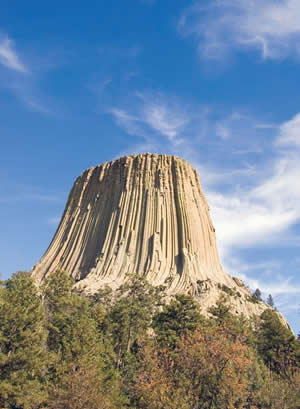The Tower

Formation
This formation was created when magma (molten
volcanic rock inside the earth) was pushed into place
underground. At the time Devils Tower formed, the
surface of the surrounding land was nearly 3,000 feet
(915 m) higher than it is today. After the magma
hardened and cooled, the area was then eroded away.
There are two theories about how Devils Tower formed.
One theory holds that Devils Tower is a laccolith. A
laccolith is a large mass of igneous (volcanic) rock
which intruded through sedimentary rock
Columns
Devils Tower is made up of spectacular vertical columns of igneous rock with five or six sides each. At the base, these columns are about 7 feet (2 m) wide, and they decrease in size to around 4 feet (1.2 m) at their peak. The columns are composed of rock containing fine-grained minerals that suggest they formed quickly and solidified at a shallow level. The columns of Devils Tower are nearly the same height, which suggests that the whole had once been a single magma pool but had fractured into separate columns as it cooled.
Erosion
Erosion of the surrounding rock layers played a key role in exposing the solidified magma. Two separate stages of erosion are suggested to have taken place to expose what is seen today. The first erosional event leveled the area to slightly above the height of the tower. The second stage eroded the remaining area into a wide valley, through which the Belle Fourche River runs today.
Interpretation
The evidence of the tower’s composition, its columns and its erosion can be studied by anyone. What needs to be remembered, however, is that each observer approaches the evidence with certain beliefs that determine how they interpret that evidence.

Evolutionary interpretation
Evolutionary geologists interpret the evidence
surrounding Devils Tower as proof of millions of years
of slow erosion. On an evolutionary timescale,
Biblical interpretation
Since creation took place around 6,000 years ago,
according to the Bible, Devils Tower could not have
formed
Consider it
If we approach the evidence with the idea that the earth is millions of years of old, we are left with inconsistencies. If Devils Tower had been exposed through slow erosion of the land, numerous things about the tower would be different. First, the formation would have most likely eroded completely away since we can observe it eroding even today. Secondly, the formation would have cracked and broken apart due to the constant freezing and thawing occurring each year over millions of years. Lastly, the top of Devils Tower would be drastically smaller than its base, as erosion slowly exposed more and more of the tower. These visible contradictions speak against the evolutionary interpretation of the evidence and confirm the biblical age of just a few thousand years.
http://www.answersingenesis.org/articles/wog/devils-tower